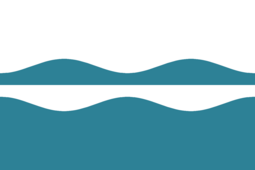Flag of Mava: Difference between revisions
| Line 27: | Line 27: | ||
|- | |- | ||
|{{ListFlag|Flag_of_the_President_of_Mava.png}} | |{{ListFlag|Flag_of_the_President_of_Mava.png}} | ||
|1970 | |1970 | ||
|Standard of the [[president of Mava]] | |Standard of the [[president of Mava]] | ||
|A white field featuring the central design from the seal of Mava. | |A white field featuring the central design from the seal of Mava. | ||
Revision as of 22:14, 27 December 2024
 | |
| Use | National flag and ensign |
|---|---|
| Proportion | 2:3 |
| Adopted | 1 March 1970 |
| Design | A horizontal bicolour of white and blue with a countercharged wave mirrored horizontally. |
The flag of Mava (Mavean: Mavaut Kuik; Almagrian: Bandera de Mava) consists of two equal horizontal bands of white (top) and blue (bottom) with a countercharged wave mirrored horizontally. The flag was formally adopted on independence in March 1970 to replace the Atitlanese flag, although the Transitional Congress had used it unofficially for a number of months before.
The Mavean name for the flag is Kuikut (lit. "our flag"), a name that is also used by non-Mavean speaking residents. The Kuikut is commonly flown across the islands as an expression of national pride and identity. Historically, indigenous Maveans disapproved of Kanisuat residents flying the flag, considering such use to be an insult. However, this view is now limited to a minority.
Other flags of Mava
| Flag | Date | Use | Description |
|---|---|---|---|

|
1970 | Standard of the president of Mava | A white field featuring the central design from the seal of Mava. |

|
c.1985 | Standard of the acting president of Mava | A white field featuring the seal of Mava. |


